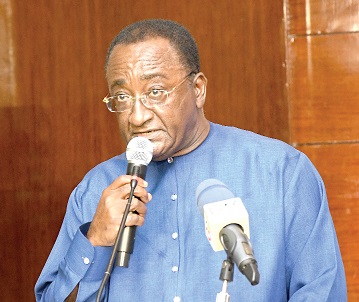
We’re investing in land management practices for increased food production - Dr Akoto
Investment in sustainable land management practices and irrigation technology is being embarked upon to boost food production in the country, the Minister of Food and Agriculture, Dr Owusu Afriyie Akoto, has said.
In addition, he said, more funds were being channelled into research, including climate information services and innovation for climate-smart agricultural practices, as part of efforts to combat the effects of climate change on agricultural production.
Dr Akoto, who was addressing a seminar on accelerating the impact of the consultative group on international agriculture research (CGIAR) and climate research for Africa (AICCRA) in Accra last Friday, said “these are critical factors in building resilience, improving productivity and protecting the livelihood of farmers”.
AICCRA
The AICCRA is a three-year project funded by the World Bank and seeks to make climate information services and climate-smart agriculture more accessible to small-scale farmers across Africa.
It operates in six team countries, including Ghana, Senegal, Mali, Ethiopia, Kenya and Zambia, with the teams collaborating across four AICCRA thematic teams — knowledge, partnerships, innovation and gender and social inclusion.
In Ghana, it aims at identifying and promoting agricultural technology that are climate-smart and what is referred to as a one-health approach which contributes to the preservation of soil, water, plant, animal and human health.
It also broadens access to safe and secure food for social groups, while helping smallholder farming to become more resilient under climate change.

According to the minister, farmers had started experiencing the effects of climate change, such as drought, floods, the outbreak of pests and diseases, as well as loss of productive lands.
The phenomenon, he said, was also rendering many farmers unproductive, as it reduced their yields drastically.
“Cocoa, which is vital to the country’s economy, is expected to experience loss of about three per cent in annual yield by 2030.
“In the third quarter of 2020, when the country’s economy contracted due to the impact of COVID-19, it was the agricultural sector that expanded, making it the only driver of GDP growth, and so investing more in agriculture is crucial,” Dr Akoto said.
Women finance
A gender smart investment specialist of AICCRA, Ms Marie Ena Derenoncourt, said majority of women had challenges in accessing finance.
She, therefore, called for inclusive financial approaches that could help increase resilience in climate change for women.
According to her, the financial sector had an important role to play in innovating and adapting existing frameworks to create opportunities for women in small and medium enterprises (SMEs) to enable them to become change agents in the transformation of food systems.
The General Manager of Newage Agriculture Solutions, Mr Martin Nartey, said there were external credit opportunities that could be made available to farmers.
He urged farmers to be innovative and amenable to adaptation to attract investors.
